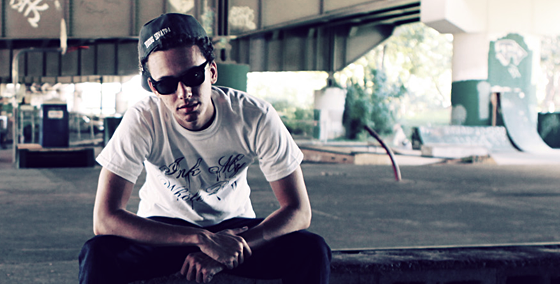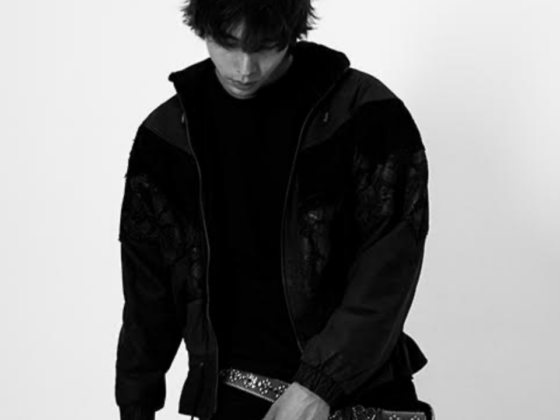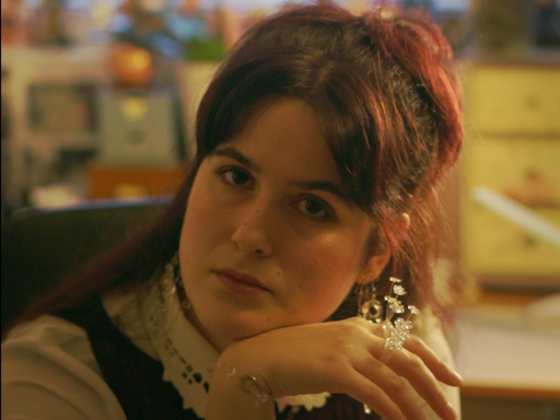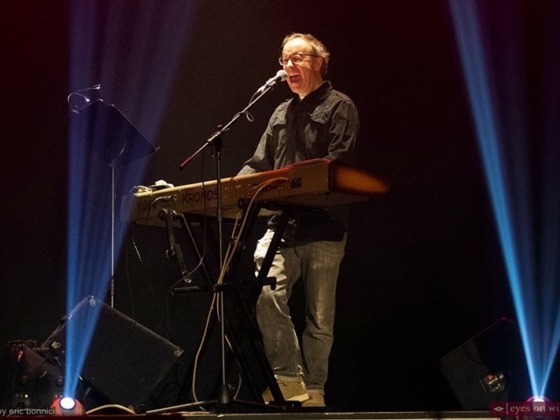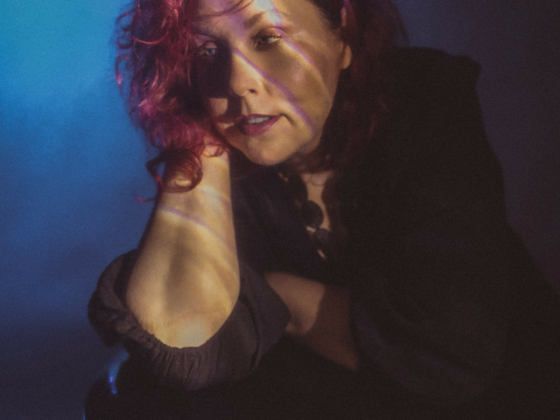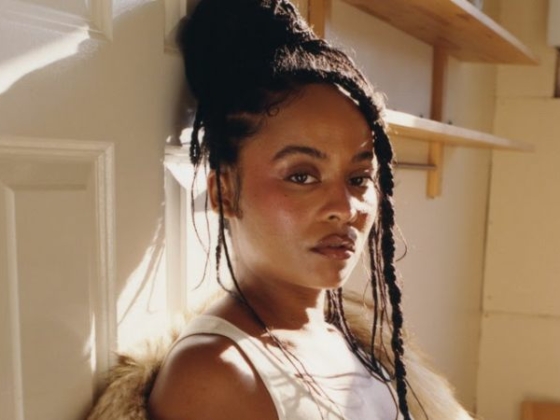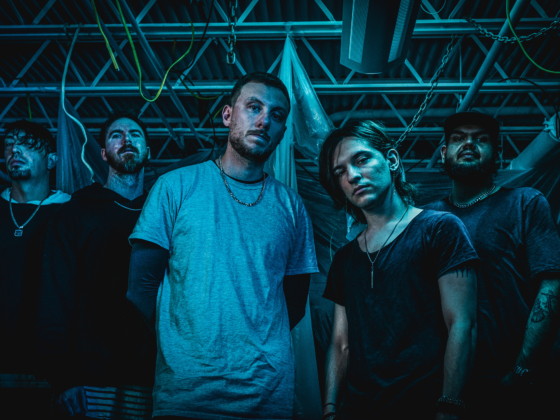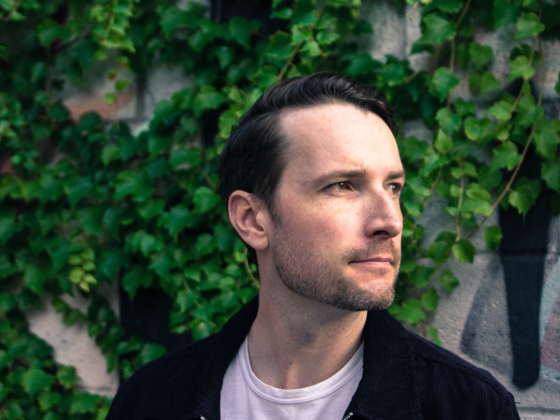Lately, EARMILK has been flooded with releases from Main Course, a label founded on the principle of free music. We met up with founders Neoteric, Astronomar, and Bot to discuss why they do what they do, the trials and tribulations of running a music label, and how they've progressed since they started. To give you a taste of what they're all about, they've each provided us with an exclusive mix to showcase their current style and steez. Each mix primarily consists of unreleased and forthcoming tracks, which means you'll be the first to hear the future of the label and their take on the experimental music scene.
Group Interview
EARMILK: First off, what is the goal of Main Course and how did it come to fruition? What were the individual roles the three of you had in forming the label?
Neoteric: I started Main Course in early 2012 while I was living in Berlin. For years, I had been signing other peoples' records to other peoples' labels. I felt like it was finally time to sign the records I wanted to my own label, and never limit the label to one sound or style – music evolves as life evolves, so basically the goal was to just release and support what we love. The jury is still out about running a "free" label though. We've sunk a bunch of money and time into the label and each release, and to be honest, we're still trying to find the magic way to do it and just recoup our costs for now. We'll figure it out though.
In March of this year, I had moved back to Canada, bought a house, settled down and started to think about what to do with the label. We only had 2 releases out at that time, and I've always loved working with others, so I guess a light went off. I had been working with Bot for a few years, previously managing Crookers before that. Astronomar was this really rad dude I met at shows over the years in Vancouver, and when he started to send me tracks, I was excited—they were so unique and interesting. I eventually started managing him as well, and we all just really clicked. We hung out in Miami and hit all the same parties, shared similar tastes in music and such. Anyways, I didn't want to do the label by myself, and thought they'd be the perfect people to work with. So we joined like the Triforce, and the rest, as they say, is history.
Astronomar: I'd say the goal of Main Course is to put out music we can trust and support on an individual level as well as a label, for free with the option to purchase. If you love the music you can have it; if you appreciate our work, you have the option to support us. If the music is acquired in either fashion I consider it a success. We want to promote our friends, and make new friends in the process. Sorry Drizzy.
N: Mar is really up on the next shit and the young producers, he's brought some great connections to the label and is such an exciting producer. Bot is a studio master, a true legend who really can produce all sorts of music and makes it sound great. He's got strong connects and a real desire to build with like minded people. I'm constantly on the emails, setting deadlines, sourcing out our materials and keeping things on track, plus I've got the golden ear haha. I think between us three, there's nothing we can't do. If only there was more time in the day.
EM: Should all music be provided free of charge, or is free music only allowed in certain situations (e.g., bootlegs and promotions)?
A: It depends on what you want to convey as a label I guess. We aren't decreasing the value of the music by making it readily available. It will eventually be available for free somewhere on the internet anyways; so why not cut out the middle man, you know?
Bot: Where discography is going no one really knows, but everyone can see that the traditional way of releasing and selling records has died years ago. You make music to sell shows and not the other way around as it had been since modern pop was born. We have to figure it out a way that works. Experiment with ways of giving away tracks but getting something back. The solution probably lies somewhere between giving away free music and having people participating to the costs voluntarily, be it with a donation, buying merchandise or attending label-held shows. Finding the right combo or even completely alternative ways is up to the new generation of labels, it is difficult but very exciting for us.
N: I vote no, absolutely not. What we're trying to do is a bit of an experiment, but we certainly don't think its the right way. Everyone needs to get paid. Our goal is to get 10,000 downloads instead of 100 sales. 100 sales of a track is actually more than 95% of independent artists sell these days. Assuming you don't have artwork, mastering and video costs to recoup, you'd see what, $20 max from that? If its a solo track. But 10,000 downloads will lead to that awareness that will sell more records, book more shows and just let people hear what you're putting out there. There's so much proof that tracks that are given out for free have a better chance to, and ultimately end up selling much more than paid only tracks. I think its all a personal preference at this point, so do what feels right. But I'd rather be able to collect off touring than off meagre record sales. The irony is that, at the end of the day in most cases, it's the graphic designers, videographers, and mastering engineers who end up making more than the artists themselves directly from sales.
EM: Do you actively seek new artists to sign, or is it on more of an as-heard basis? What sound do you go for when looking for new Main Course artists?
A: Personally, I listen to every demo I receive. Unfortunately there isn't enough time in a day to respond to every track with detailed feedback, but I try my best. When I'm listening to the demos we receive, the first thing I pay attention to is how it sounds and not so much what the track is doing. If the track is doing something really interesting, but it sounds flat I'll have a hard time enjoying it.
N: Not really, it usually just comes to us from some channel or another. A friends recommendation, hearing something on a mix, and of course incoming demos. But we're all pretty active seekers as DJs so I guess that happens naturally, but we certainly have no shortage of demos. Thanks to everyone that sends them. As Mar said we can't always reply, and perhaps sign 1%, but keep sending them if you like what we're doing.
EM: What's next up in the label's game plan? Will we be seeing a Main Course sponsored festival stage or an annual compilation album?
A: We are actually throwing around the idea of setting up a stage or side room organized for SXSW and/or Miami Music Week… TBA….. and a SNACKS compilation and Remix compilation are marinating as we speak!
N: Yeah, I've been putting out feelers and asking around about Miami and Texas. It'd be great to have a second room or something like that for a Main Course party. Just something for friends to come to and have some drinks and play. Nothing too serious to start, but I think we dream of being able to put together stages for festivals down the road. I think you'll be seeing more compilation albums too, it's just the most effective way of supporting the most artists at one time, and we really do want to get behind our friends however we can.
B: As Mar and Neo are saying we are starting from the bottom and we will be more than happy to have a second room at a good party during SXSW and WMC next year. We are still at a stage where we are building an audience and trying to keep the quality high by curating every aspect of Main Course. Fingers crossed and lot of work to make that happen.
EM: What genre or sound do you see the electronic music community steering towards after deep house?
A: I'd love to see a resurgence of Liquid D'n'B as well as some tribal themes make their way back into popular music. Wouldn't be mad if Jungle got big either.
N: I really don't know. I'm not sure if it's getting old, or reading too much on the internet but the whole cycle of multi genre explosions kind of does my head in. Good will always come of it, but so much bad too. To answer the question I'd say New Jack Swing, but then also regret that choice a year later, haha.
B: I don't think there really is such a community. Deep house is old news, it's the reason I started getting into house music 12 years ago and it was not at all new even back then. It's just a very versatile genre and yes, the cool kids like it now but we have been witness to such a fast consumption of genres in the last 3 years that it would be healthy to just stop, relax and listen to the music we like regardless of genres instead of asking ourselves what the next big thing is. It's also the reason why Main Course is a strictly non genre bound label.
EM: What is the most difficult aspect of managing a label? The most fun?
A: For me the most difficult part is getting to the post office before they close to mail out our shirt purchases! The most fun part is working with my friends and going through music.
N: Fear of letting the artists down is huge for me. We want to do the best we possibly can, and I tell everyone to just…communicate. We're all busy, all overloaded, sometimes things slip through the cracks, but in these times we have to work together, and when an artist says they want something or have an idea, it gets done. I think the days of simply giving a record to a label and expecting the world in return are over. It's a massive effort between the label, artists, managers, and fans to all come together somehow. Also, the emails never, ever stop.
EM: All three of you are extremely creative with the sound effects and samples you use in your music. How do you decided which ones will make it into a given track? Do you have an idea like, "I really like this *boingy* sound, maybe a flute/recorder will go well with it!"?
A: I think part of what sets the three of us apart is we take risks, sonically. In theory what we do might not "work", but it's music after all and it's worth experimenting; and it usually ends up "working" in some capacity.
B: When the weirdness is functional to your track. That's when it works and elevates itself from noise to the status of sound.
N: I love finding weird sounds. I just keep a playlist that I fill up with different tracks and samples that catch my ear, idea-wise. Then when it's time to work, it's easy to find it and combine into something new. As a kid that grew up on Hip Hop, I'm big on sampling.
EM: Is there a go-to template you use when starting a brand new track? Drums first bass second, for example? In other words, what is the first thing you do when beginning a new project.
A: First thing I do is find a bangin "Donk" from my Hardstyle library, lol nah first thing I usually do is design some drums and get them working together. From there the ideas start flowing and the abstractions are endless.
B: In the beginning there was the kickdrum…but that's not even true all the time, sometimes I start with a beat and sometimes with a rough melodic idea, there really are no rules for me.
N: Always build around the sample or idea. Generally lay some generic loops under and once I have the concept, I'll replace or chop them up with real drum sounds until they sound proper.
EM: What misconceptions did you have about producing and DJing when you started out that have been disproven now that you are experienced members of the music community?
A: People won't dance to a beatjuggling & skratch routine for more than a couple minutes… unless of course you are Craze, A-trak or Klever.
N: I'm not sure this one has been disproven, and maybe I'm wrong, but I'm absolutely sick of the pigeonholed 'one way' thinking that it seems we have to fall into. We all love all sorts of music. Why can't we play everything, or make everything? Maybe Diplo can do this, but who else? Do we need separate aliases for every genre? I don't know…I'd like to think not. In a way I understand but I still fight it—with the label, with my sets. It just seems like a rule I want to break. I sometimes think 60% of people expect me to play wild kind of club stuff, where 20% might know me from the House stuff and want to hear that. The other 20% just like my "White Light Mixes" series and expect me to play cosmic disco. But I grew up playing Hip Hop and party tracks so…I guess I stopped caring. If it's good I fuck with it – isn't that how everyone should be?
B: Totally agree with Neo on this, the genre police have no place in a club. They should stay home writing mean comments on youtube, no party needs them. My eyes opened on that some time ago when I saw that the playlists of a legendary and extremely important club like the Hacienda in Manchester in the late 80's contained so many tracks of different genres. That's the right spirit!
Individual Questions and Exclusive Mixes
Bot
EM: How has being a part of Crookers affected both your production and performance styles today?
B: It has been part of my artistic life for years. I am the result of all these experiences, from before Crookers to now. But of course that was a quite intense one and I learned a lot from it.
EM: What was the most important thing you learned from working as a duo that changed when you went solo?
B: On that side not much. We used to work in separate studios most of the times so not much has changed. I still collaborate with people over the internet a lot.
[soundcloud url="https://api.soundcloud.com/tracks/110800460%3Fsecret_token%3Ds-PxvQm" params="" width=" 100%" height="166" iframe="true" /]
Neoteric
EM: Have you found that making it big in this industry takes more luck than skill? Is there a proper way to get your music heard?
N: I think luck helps, but skill is needed in all regards. Your skill however could be social networking, DJing, bringing people together, executing ideas, producing or whatever. You can be an amazing producer who no one hears, or a great networker who doesn't produce as much as they should (I certainly fall into that category). But we need all these types of people in music. You can't get anywhere without the help of others, and you certainly won't be anywhere long without helping people in return. There are a few proper ways to get your music heard as I see it: 1) Don't be annoying; 2) Really know your target crowd/person/blog whatever—you have to understand what you're doing and try to get it in the right channels. Massive spam emails never, ever work; 3) Find the people doing what you want to do, who are where you want to be. Do your research, pay attention and find a way in. Introduce yourself at shows, send the right emails, and use social media to your advantage. And finally, don't let 'making it big' be your motivation because you'll be setting yourself up for major disappointment. Do it because you love it. Work at it and who knows what could happen. Maybe you will tour the world for 2 years like mad! Then another 3 years just a bit. Then what though? Whats the reality after that? Shit, that just got dark. Do it because you love it, and you'd do it for free. That's what you'll most likely be doing…but at least you'll be having fun.
EM: Who has been the most influential person you've worked with so far?
N: Switch opened so many doors for me, it was an instant co-sign and helped me meet so many great people, including Crookers, who really changed my life and influenced it heavily. We met via the Dubsided connection when they came to Vancouver for a show (they wanted tracks haha). We stayed in touch after that and when I was moving to Europe, they called me out of the blue and asked me to work with them. That absolutely altered my whole brain chemistry, I think. I was completely green to almost all aspects of the industry, and learned so much. I never managed anyone before, but I guess I had a mind for it. I was able to tour the world, shake everyone's hand and make some amazing friendships. But it also showed me what was possible in music, and inspired me to want to continue on in management, with the label and music in general. I'll always be so thankful to them for that!
[soundcloud url="https://api.soundcloud.com/tracks/110804479%3Fsecret_token%3Ds-QPArE" params="" width=" 100%" height="166" iframe="true" /]
Astronomar
EM: What have you learned that no textbook, YouTube video, or manual can teach you with regards to production? About managing a label?
A: There is no inherent sense of convention if you choose to enter without doing indepth research, but also you develop a spidey sense for things that can and can't work within your understanding; which tend to be a bit more skewed and maybe even more unexpected than those of a person with a conventional approach.
EM: Of all the places you've played in your career, which one stands out most in your memory?
A: It's very recent, but I literally just got home from my first international tour. I spent 2 weeks in Australia and played in 5 cities and engaged with a lot of my active social media followers (who happen to be Australian) which was really amazing! I felt a profound level of appreciation for what I've been doing the past few years, and that is the sweetest reward.
[soundcloud url="https://api.soundcloud.com/tracks/110802718%3Fsecret_token%3Ds-nLlPi" params="" width=" 100%" height="166" iframe="true" /]


